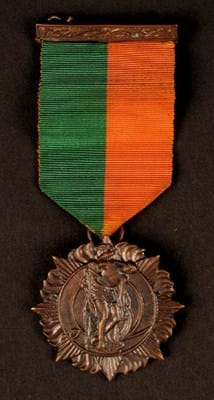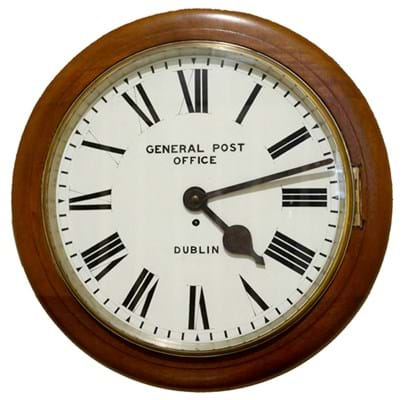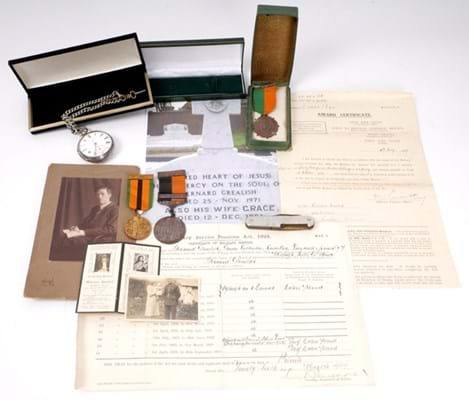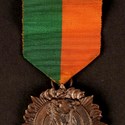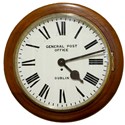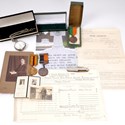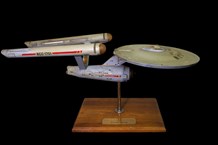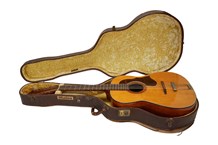Awarded posthumously to Joseph Plunkett, a 1916 Rising bronze medal on green and orange silk poplin ribbon, the reverse numbered ’70’, sold at Whyte’s of Dublin on January 21 to a collector in County Donegal for a low-estimate €40,000 (£30,400), plus 23% buyer's premium.
Sometime in 1915 Plunkett joined the Irish Republican Brotherhood and soon after was sent to Germany to meet with Roger Casement, who was negotiating with the German government on behalf of Ireland.
Plunkett successfully secured a promise of a German arms shipment to coincide with the rising. He was one of the original members of the IRB Military Committee that was responsible for planning the Easter Rising, and it was largely his plan that was followed.
Shortly before it was to begin, Plunkett was hospitalised and had an operation on his neck glands days before Easter and had to struggle out of bed to take part in what was to follow. Still bandaged, he took his place in the General Post Office with several other of the rising's leaders such as Patrick Pearse and Tom Clarke, though his health prevented him from being terribly active.
Plunkett’s energetic aide de camp was Captain Michael Collins. Following the surrender Plunkett was held in Kilmainham Gaol, and faced a court martial. Seven hours before his execution by firing squad at the age of 28, he was married in the prison chapel to his fiance, Grace Gifford.
His widow became a prominent republican, opposed the 1921 Treaty and was imprisoned by the Irish Free State government. In 1941 she refused to attend a ceremony to receive her husband's 1916 Rising medal. This was probably a protest against the government's wartime policy of internment of IRA members, many of whom were known to her.
When the medal was posted to her she threw it in the bin, where it was rescued by Cathal Gannon. Grace told him to keep it as she didn't want it. She was also embittered with the Plunkett family as they prevented her from receiving anything from her husband's estate and she had had to sue Count George Plunkett to receive a settlement of only £700 in 1934.
From Gannon it came to the present vendor.
Easter Rising medals
According to the Medal Yearbook 2016, 1906 of the 2000 medals for the Easter Rising instituted in January 1941 were issued. It adds: “Of these, 266 were named and presented to the next of kin of those who had died before the date of issue, including the 88 killed in the rebellion and 16 executed afterwards. The remainder were issued unnamed. Another 450 medals were struck and issued later.”
Named casualty medals to significant figures, at the centre of the Dublin action, will be particularly sought-after.
Also in that January 21 Eclectic Collector auction, Whyte’s sold a 1916 medal awarded to Galway veteran Bernard Grealish together with personal effects for a hammer price of €2200 (£1970) to a US collector, against an estimate of €2000-3000. He served in Co Galway at the Agricultural Station, Moyode Castle and at Limepark in Easter week 1916.
The Rising collecting market
Ian Whyte, the auction house’s managing director, says: “Regarding the 1916 Rising, we sold over €500,000 worth of related collectables during the centenary year. The highest price paid was €225,000 (including fees - €185,000 hammer) for the 1916 Proclamation.
“We negotiated the sale of the James Connolly and family’s medals to the National Museum of Ireland for a five-figure sum. There was a substantial increase in consignments of material from the 1916-22 period which may tail off now.”
Connolly was appointed the day before the Rising by Irish Republican Brotherhood Military Council members as vice-president of the Irish Republic and Commandant-General, Dublin Division, Irish Army. One of the most effective rebel leaders, he was severely wounded on April 27. His execution took place at Kilmainham Gaol after dawn on May 12 – the last of the rebel leaders to face the firing squad.
Whyte adds: “We are now into a series of historical anniversaries including the First Dáil in 1919, the War of Independence 1919-21, the Treaty of 1921, the foundation of the Irish Free State in 1922 and the Civil War of 1922-23.
“However, based on my memories as a young dealer in the 1960s and early ‘70s, there was not as much fuss then about those events and I somehow think that there won’t be as much fuss about them now as the 1916 events were somewhat over-commemorated last year. I hope to be proved wrong and that we will get some good prices for militaria and memorabilia of that period as well.”
Whyte says that his saleroom also noticed a good interest in medals and militaria of the Irish regiments in the First World War but didn’t get a lot of consignments. Most of the Irish medals are already in Britain and tend to be sold at DNW, Spink and the other London houses, he says.


